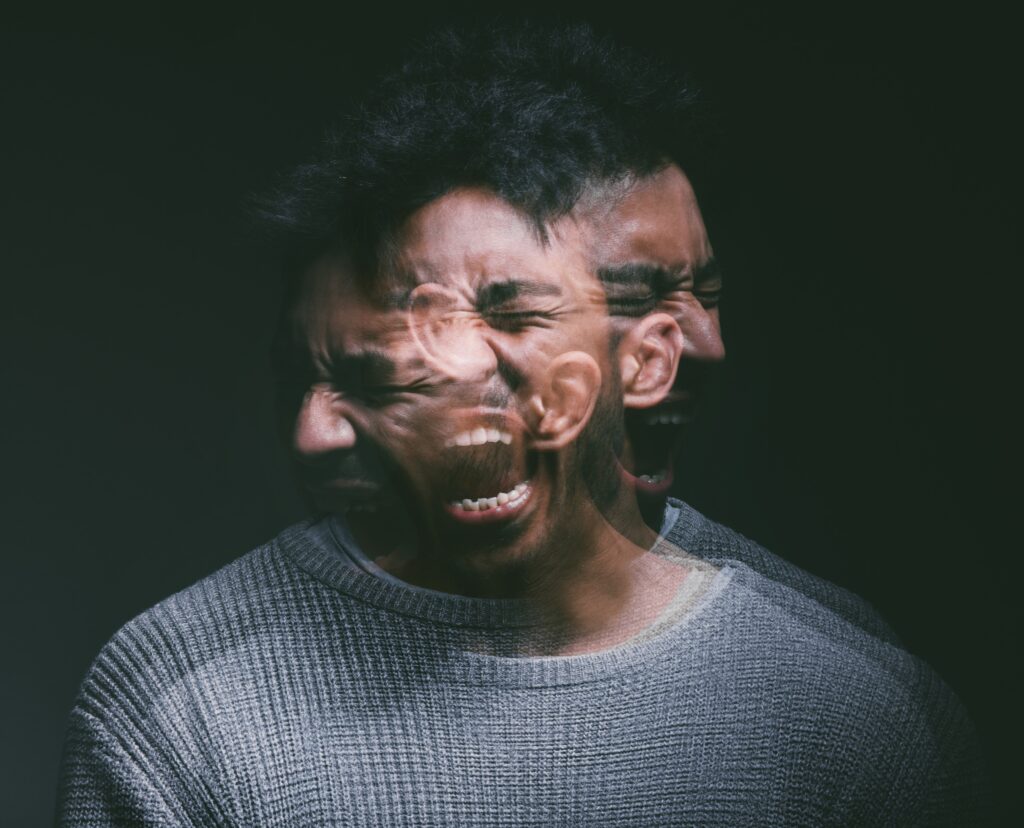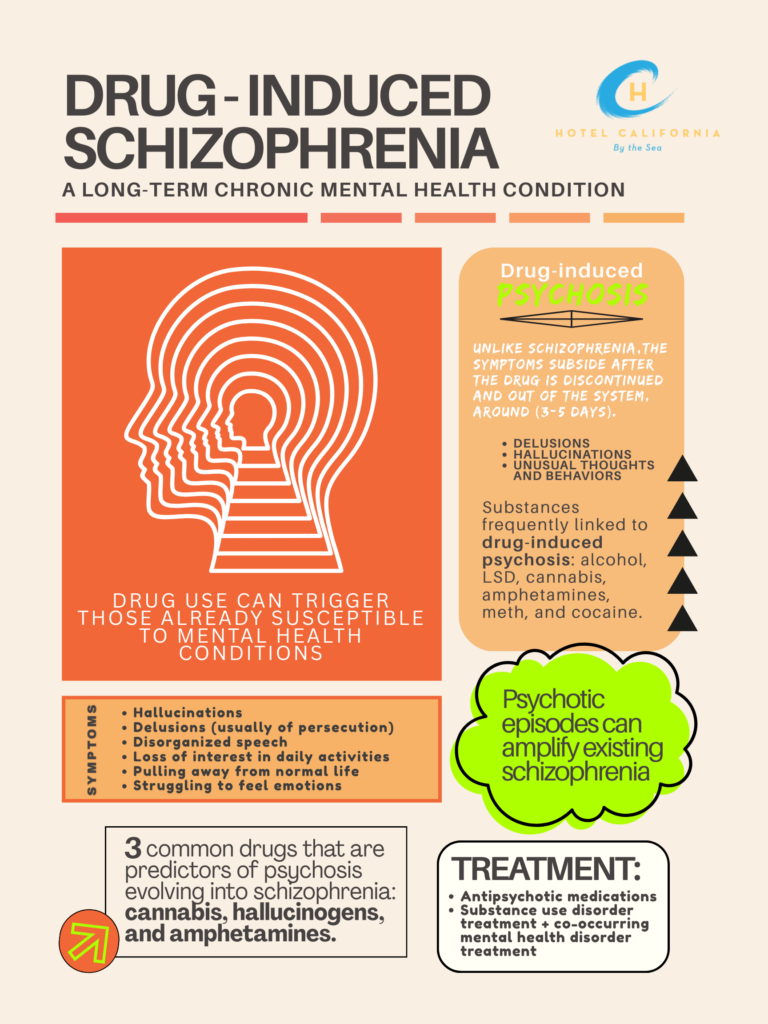Drug Induced Schizophrenia
What is drug-induced schizophrenia and what can cause it? Recreational drugs like cannabis or hallucinogens can alter a person’s perception of reality. This can cause drug-induced psychosis, which is the inability to distinguish what is real. With continued abuse of these types of drugs, the psychosis can turn into drug-induced schizophrenia.

Drug-induced schizophrenia is an unofficial term that refers to a person experiencing symptoms of schizophrenia triggered by drug use. It is a chronic psychotic disorder that causes a person to experience hallucinations and delusions. These symptoms will occur even when you are not using drugs. When psychosis continues to persist even after initial substance use has ended, it can turn into a lifelong condition. Drug induced schizophrenia is a challenging disorder to manage because it can impact various aspects of your life.
What is Schizophrenia?
Schizophrenia is a type of psychotic disorder. It can create psychotic symptoms that greatly impact your life, well-being and happiness. Doctors and scientists do not fully understand schizophrenia, but have come to the conclusion that environmental, social and biological factors play a contributing role in the development of this mental health disorder.
Risk factors for schizophrenia include being male gender, being of a younger age, genetics and having a substantial first hospital visit for symptoms of psychosis. Some of the main symptoms that define schizophrenia include the following.
Delusions. Delusions are fixed or false beliefs that are not based on reality. An example would be a person believing there are others out there to hurt you, thinking there are others out there who can hear your inner thoughts and believing that there are others out there who are putting thoughts into your mind.
Hallucinations. Hallucinations are sensory experiences that do not exist in reality. It can be auditory, visual, tactile, olfactory or gustatory hallucinations. An example of this would be a person who is seeing things that aren’t there or hearing voices that no one else can hear.
Disorganized speech. When a person has disorganized speech, they may jump from topic to topic with seemingly no connection between the two subjects. They may also behave oddly and speak as if they have the mentality of a child or can become easily agitated.

Other common symptoms of Schizophrenia
- Loss of motivation
- Low energy
- Loss of interest in daily activities
- Pulling away from normal life
- Struggling to feel emotions
- Difficulty thinking clearly
- Difficulty focusing and remembering things
Drug-Induced Psychosis
Psychosis is a disconnection from reality that causes a person to experience delusions and hallucinations. People tend to believe untrue things and experience things that are not there or happening. Symptoms of psychosis include delusions, hallucinations, unusual behavior and changes in thinking.
Drug-induced psychosis is psychosis induced by drugs. It is also referred to as medication-induced psychosis or substance-induced psychotic disorder. Substances that are more frequently linked to drug induced psychosis include cannabis, amphetamines, meth and cocaine. New research is finding that medications such as antibiotics, antihistamines, corticosteroids, heart medications and pain relievers can also be linked to psychosis.
Some studies found that as many as 10% of cannabis users will experience psychotic symptoms at some point during their use. About 87% of cocaine users will also experience psychotic symptoms. And almost 15% of amphetamine users and more than 11% of meth users have reported experiencing psychotic symptoms.
When it comes to drug-induced psychosis, users generally recover within 3-5 days. The symptoms subside when the drug is no longer in the system. If you notice symptoms lingering for longer, it could be due to other mental health conditions, a neurological disorder or another diagnosis that can lead to the development of psychosis.
Check Your Insurance Coverage for FREE
Find out if your insurance covers addiction treatment in minutes. We accept most insurance!
Drug-Induced Schizophrenia
Drug-induced schizophrenia is a long-term condition where symptoms remain ongoing despite cessation of drug use. It is the development of schizophrenia due to the use of drugs or substances. The drugs and substances do not directly cause schizophrenia, but they can lead to the development of the mental health condition.
The main symptoms of the condition include delusions, disorganized speech, hallucinations, catatonic or erratic behavior, loss of function for daily tasks and the diminished ability to experience positive emotions and joy. To be clinically diagnosed with schizophrenia, a person must be experiencing two of the above symptoms regularly and one of them must be delusions, disorganized speech or hallucinations.
The mental health condition can begin as drug-induced psychosis. In fact, one study found that one in four people who experience drug-induced psychosis eventually develop drug-induced schizophrenia. Substance-induced psychosis is a significant risk factor for later developing schizophrenia. It is a lifelong and chronic disorder that you will experience for the rest of your life.
What is the difference between Drug-Induced Psychosis and Drug-Induced Schizophrenia?
Drug use can change the levels of neurotransmitters in the brain. This causes the brain to process information in atypical ways. This anomaly also occurs in the brain of a person experiencing schizophrenia. A 2020 study found that there are three common types of drugs with the strongest predictors of a person experiencing psychosis and evolving into schizophrenia. These drugs include cannabis, hallucinogens, and amphetamines.
Other substances such as inhalants, alcohol, sedatives, hypnotics, cocaine and antianxiety medications can also be linked to psychosis and schizophrenia. However, they do not have as strong of a connection.
Drug-induced psychosis is a short-term condition. It happens when your brain has a lapse in the ability to understand what is real and what is not. Recreational users purposefully seek out this feeling when abusing drugs. The symptoms of psychosis should end after the substance is no longer affecting your central nervous system.
Drug-induced schizophrenia is a long-term, chronic mental health condition. Symptoms of this condition last longer than 6 months. It occurs after substance use, but is not directly a result of substance use. It can be triggered by results of complex factors such as biology, hereditary risk and other mental health conditions that already exist.
Reach out to Hotel California by the Sea
We specialize in treating addiction and other co-occurring disorders, such as PTSD. Our Admissions specialists are available to walk you through the best options for treating your addiction.
Treatment for Drug-Induced Schizophrenia
Not everyone who experiences drug-induced psychosis will develop schizophrenia down the line. But, there are some who will and some who are more prone to the mental health disorder. Those who are already susceptible to the condition can be triggered by drug use and psychotic episodes. Recreational drug use and abusing drugs for the purpose of seeking a psychotic experience can turn into a chronic condition that leads to schizophrenia.
For a person who is already diagnosed with schizophrenia and who also misuses mind-altering substances, it can be very difficult to distinguish between the two conditions. It also makes it much more difficult to effectively treat. Hotel California by the Sea provides substance use disorder treatment as well as co-occurring mental health disorder treatment.
We offer treatment at all levels of care, including detox, residential, PHP and IOP. We utilize evidence-based treatment methods such as CBT, DBT and group therapy. Hotel California by the Sea provides the tools, resources and support clients need to reach their goals of sobriety and overcome their addiction.
References:
https://www.healthline.com/health/schizophrenia/drug-induced-schizophrenia
https://www.medicalnewstoday.com/articles/drug-induced-schizophrenia
https://www.goodrx.com/well-being/substance-use/drug-induced-schizophrenia
https://www.verywellhealth.com/drug-induced-schizophrenia-5198685
https://www.healthcentral.com/condition/schizophrenia/drug-induced-psychosis
